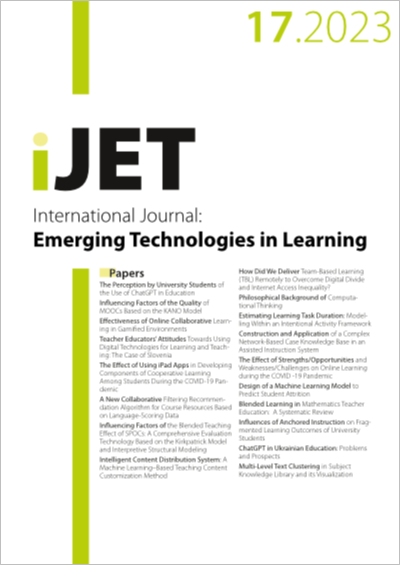Effectiveness of Online Collaborative Learning in Gamified Environments
DOI:
https://doi.org/10.3991/ijet.v18i17.42851Keywords:
Online collaborative learning; gamified learning; flow experience; intrinsic motivation; academic performanceAbstract
Online education, supported by emerging technologies, such as the Internet, big data, and industrial intelligence, is becoming a growing trend. Gamified learning is gaining popularity within educational environments. Educational games serve as the medium for this type of learning and as tools to support learning. They create real-world situations for students to solve tasks, effectively cultivating problem-solving, critical thinking, and creativity skills. In gamified teaching, collaborative learning helps players in completing game tasks by focusing on cooperation and learning essential knowledge or skills. This study selected 300 students from Harbin University of Science and Technology as research subjects. A single-factor, two-level between-subjects design was used to examine the influence of online collaborative learning (independent variable) on flow experience, intrinsic motivation, and academic performance (dependent variables). The participants were divided into an experimental group (two-player collaborative game group, N = 150) and a control group (single-player game group, N = 150). After completing their assigned tasks, the participants independently completed questionnaires and tests. Data were then analyzed using SPSS 25.0 software. Results show that there is no significant difference in prior knowledge between the two groups. However, notable differences are found in flow experience, intrinsic motivation, and academic performance. The experimental group demonstrates significantly better academic performance than the control group, indicating the effectiveness of collaborative learning within gamified learning. Flow experience has a partial mediating role in collaborative learning, whereas intrinsic motivation has a full mediating role. These findings have critical implications for understanding the impact mechanism of collaborative learning on academic performance in gamified learning, promoting the effective utilization of educational games, and accelerating the exploration and application of gamified learning models.
Downloads
Published
How to Cite
Issue
Section
License
Copyright (c) 2023 Erdong Zheng, Qiuying Wang

This work is licensed under a Creative Commons Attribution 4.0 International License.



